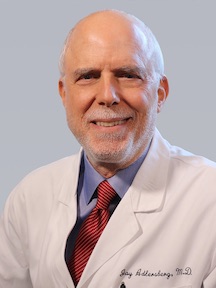By Claretta Bellamy
Dr. Jay Ben Adlersberg (ΦBK, University of Pittsburgh) has had a unique and successful career while being a familiar face on viewer’s television screens. Stemming from his liberal arts education, his dual interests in medicine and writing allowed him to become both a full-time medical practitioner and a health news expert for live television. After working at WABC-TV’s Eyewitness News for 30 years, he recently joined NY Health to continue using his medical skills to treat the community around him.
Born and raised in Pittsburgh, Pennsylvania, Adlersberg grew up in an educational setting. Being a part of a progressive school program, he was able to skip his senior year of high school and start his first year of college at the University of Pittsburgh in 1961. In 1965, he attended the Perelman School of Medicine at the University of Pennsylvania. His residency was spent at the NYU/ Bellevue Medical Centers and at NYU’s Irvington House Institute where he trained for six years in internal medicine and rheumatology. In 1974, he went on to the Albert Einstein College of Medicine in the Bronx, where he began teaching in the Department of Rheumatology and Immunology.
After spending some time working in a laboratory setting, Adlersberg realized he missed people. Later that same year, he opened his own office in Manhattan, where he began practicing rheumatology. Although successful, he craved something more.
“It was great to be practicing medicine, but that was all that I was doing, and I needed something else,” said Adlersberg. “I was talking to a friend about this, and he said ‘Why don’t you just sit down from time to time and think of what it really is that you like to do and do well?’ It turns out, it was writing.”
After Adlersberg began exploring additional career choices, he started to be more involved with writing. While still practicing medicine, he became a medical columnist for The Bridgehampton Sun, a weekly newspaper on Long Island. During this time, he also grew interested in television writing, noticing that none of the local television news stations had a doctor on the air. His sparked interest would soon prove to be reality. While attending an outing in Bridgehampton, Adlersberg was approached by a producer for WABC-TV who wanted him to write for television. Out of the 75 doctors who interviewed for the position, he was the only candidate who had a dual interest in both performing on-air and writing his own stories.
“I could do both,” says Adlersberg. “I was a doctor, and I could write — and that’s why they hired me.”
Officially hired in 1983, Adlersberg was an on-air medical reporter for WABC-TV Eyewitness News for the next 30 years. In addition to working for the news station five nights a week, he also continued practicing medicine as a full-time doctor, juggling two full-time jobs. Although it was challenging, Adlersberg’s career as both a medical and writing professional proved to be successful. In 1985, he was nominated for an Emmy Award, and in 2001 was honored with a Peabody Award along with the entire Eyewitness News team, for working two weeks straight with little to no sleep covering the September 11 terrorist attack. As a medical expert, Adlersberg had the responsibility of explaining to viewers the physical and psychological aftermath of the attack on people’s health, such as the dangers of chemical dust exposure.
“When I look back on it, the only thing I think to myself is ‘how did I manage two full-time jobs for 30 years?’” says Adlersberg. “It was a lot of work. I had plenty of energy I guess — and I had very good help, in the office and at the station.”
Although Adlersberg had a thriving career working for Eyewitness News, he decided to leave in 2013. Still working as rheumatologist at his own practice, in January 2020 he decided to join the NY Health team as part of their new development to form a multi-specialty medical group. Prior to joining NY Health, Adlersberg gave infusions to his patients but had to send them to a different location to do so.
“NY Health thought it would be a great idea if I came on board because I had all these patients that needed infusions, and they had infustion centers already operating. It’s a great place. I’m very glad I went there.”
Looking back on his career, Adlersberg acknowledges the importance of his liberal arts and sciences education. When Adlersberg was an undergraduate student, he was a double major in biology and English literature, and was inducted into Phi Beta Kappa during his junior year in 1964. In addition to helping him discover his ability to write, Adlersberg says that attending a liberal arts and sciences college also allowed him to learn French, which became useful when traveling abroad, and to explore classics and political science.
“As an educational philosophy, I don’t know how anyone would choose anything else if they wanted to widen their scope of thinking,” he says. “I am so grateful that I had the education that I did.”
Holding on to this same philosophy is what Adlersberg recommends for those pursuing a career in the medical field. He says to not focus on the sciences only, but to have a broader view of the world by studying different subjects and learning novel approaches to life.
“Looking back, all the various branches of my life tree blossomed at being inducted into ΦBK,” says Adlersberg. “I was able to grow my practice by becoming a journalist, and I never would have if I had toed the line and walked in the linear footsteps of medicine. I went outside the box and it proved to be a wonderful life, and it still is.”
Claretta Bellamy earned her bachelor’s degree in journalism at Rutgers University, where she was inducted into Phi Beta Kappa in 2019. Rutgers University is home to the Alpha of New Jersey chapter of Phi Beta Kappa.




